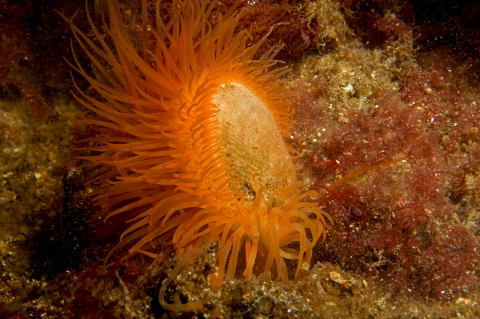Natural resources
Provisioning services
Fisheries in the inshore waters of Scotland are now predominantly for shellfish, particularly Nephrops (Norway lobster / langoustine / ‘scampi’), scallops, crabs and lobsters. This direct commercial use of marine wildlife has a long and varied history of financial benefit from the marine environment. Sustaining this benefit depends on catch rates being within the natural limits of the populations, but also on the condition and functioning of the supporting habitats.
Cultural services
The history of the fishing industry has an associated cultural identity. Although eroded in some places, this is more evident for shellfish fisheries as they dominate the inshore sector and mostly work relatively local areas from coastal towns and villages. Small fishing ports are socially valued places, attracting tourists, artists and other visitors. The contemporary continuation of this culture and associated benefits is tied to the sustainability of the fisheries more generally. There is potential for wider awareness of this cultural heritage, through various communication channels, and its dependency on nature and sustainable fisheries to contribute to this aspect of Scotland’s identity. Some shellfish are also the subject of scientific research, which is a necessity for their management but also for academic interest that contributes to our wider knowledge of the marine environment.
Functions
Regulating services
Shellfish and other invertebrates contribute in a number of different ways for example, bivalves (e.g. scallops, clams, mussels) feed by filtering large volumes of seawater and in doing so support the breakdown of waste and the detoxification of water and sediment. Crustaceans (e.g. crabs, lobsters, langoustines) are scavengers and so also contribute to this function by consuming organic waste of both natural and anthropogenic sources. Gastropods (snails) and echinoderms (urchins and sea stars) also help maintain a balanced ecosystem, grazing algal turfs and seaweeds. The biological and genetic diversity of shellfish and broader invertebrate communities will also support wider ecosystem resilience to invasive species and disease.
Supporting services
The benefits of shellfish and other invertebrates are underpinned by natural processes and interactions with prey sources and habitats, including:
- Biomass production
- Predator-prey interactions
- Nutrient cycling
- Larval/gamete supply (supporting connectivity)
Ensuring these natural processes continue enables the ongoing supply of a wide range of benefits to people and nature
Benefits for people
- Health and well-being
- Knowledge
- Clean water and sediments
- Spiritual / cultural
- Jobs and business
- Tourism and recreation
- Food and nutrition








